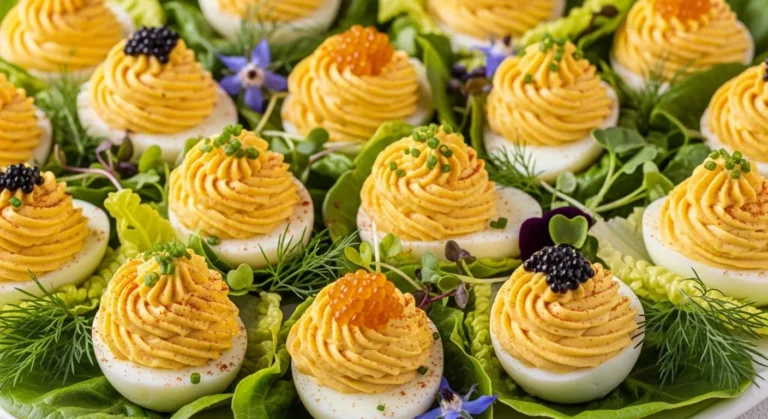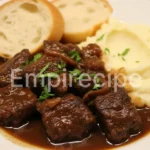The Best Fluffy Pancakes recipe you will fall in love with. Full of tips and tricks to help you make the best pancakes.
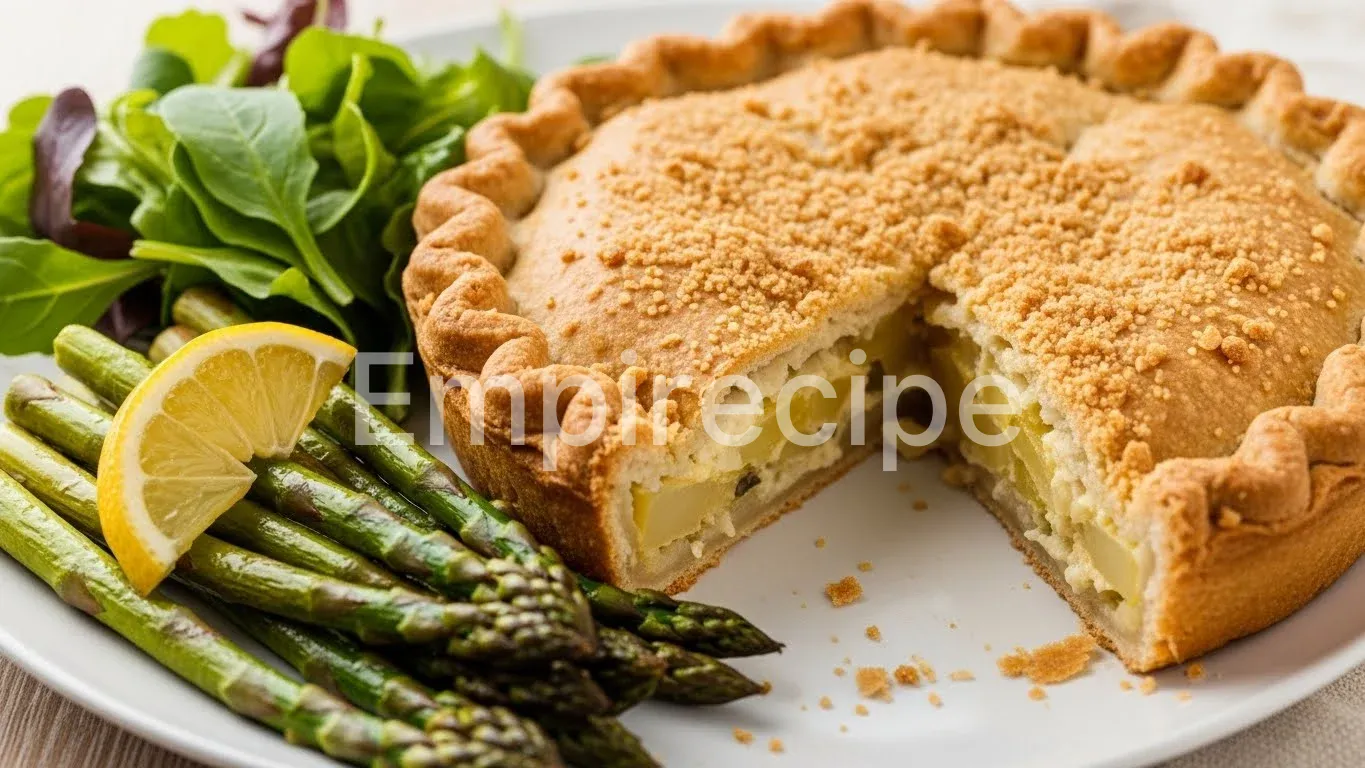
Prepare to fall in love with the ultimate comfort food for your Passover Seder: our incredible Passover Potato Pie. This savory pie delivers a delightful contrast of creamy, fluffy potatoes with a perfectly golden, crispy crust. Infused with aromatic herbs, it brings warmth and rich flavor to any table. This timeless classic truly embodies both tradition and incredible taste.
Table of Contents
Why You’ll Love This Passover Potato Pie
This traditional potato pie is more than just a side dish; it’s a centerpiece of comfort and joy. Here’s why you’ll adore creating and sharing this amazing recipe:
- Rich, Comforting Flavors: Savor the harmonious blend of creamy potatoes and aromatic herbs, all crowned with a delightful crispy top.
- Effortless Preparation: Even with its gourmet appeal, this dish is surprisingly simple to assemble, making it perfect for busy Seder hosts or weeknight meals.
- Naturally Gluten-Free: Crafted from wholesome ingredients, this potato pie is naturally free from gluten, making it inclusive for many dietary needs.
- Nutrient-Packed Goodness: Enjoy a hearty meal rich in essential vitamins and minerals, promoting well-being with every satisfying bite.
- Versatile for Any Occasion: While perfect for Passover, this delicious potato pie recipe shines at holiday gatherings, family dinners, or as a comforting side.
Ingredients You’ll Need
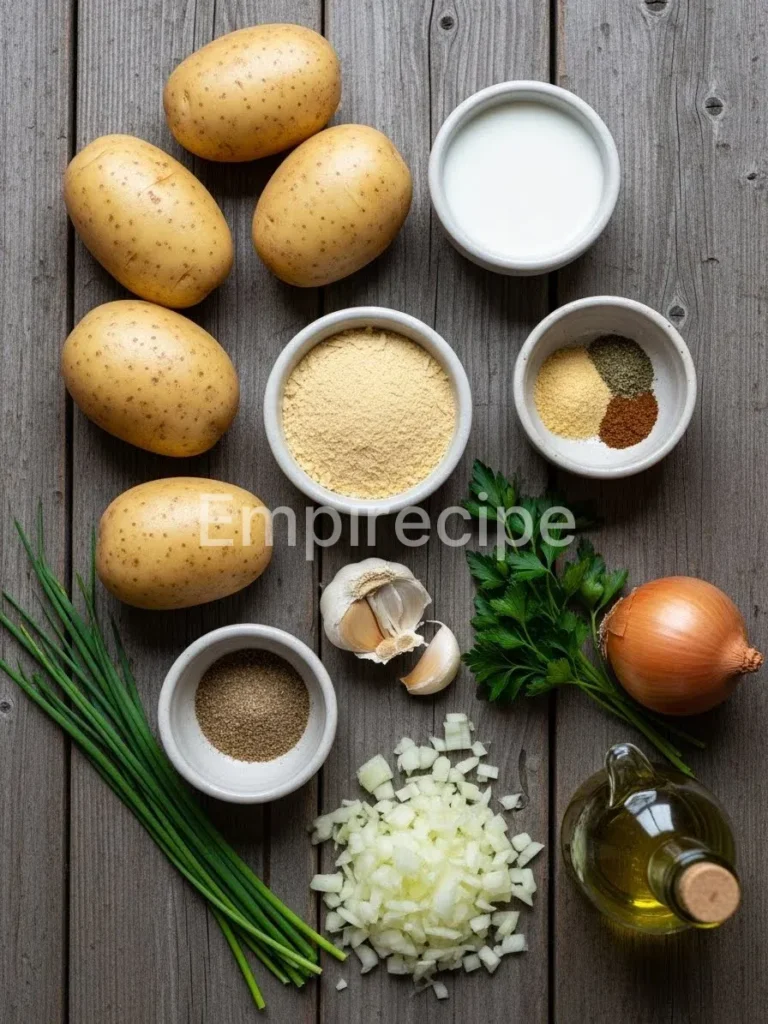
Crafting the perfect Passover Potato Pie begins with selecting high-quality, fresh ingredients. These carefully chosen components ensure a truly unforgettable flavor and texture.
- 2.5 lbs Russet or Yukon Gold Potatoes: These varieties are ideal for mashing, offering a creamy, fluffy texture without becoming gummy. Opt for firm, blemish-free potatoes for the best results.
- 1/2 cup Plant-Based Milk (Unsweetened Almond or Oat): A wonderful dairy-free alternative that adds richness and moisture without overpowering the potato flavor. Choose unsweetened to maintain the savory profile of this traditional potato pie.
- 1/4 cup Nutritional Yeast: This magical ingredient lends a cheesy, umami depth, making our potato pie irresistibly flavorful and enriching its nutritional value. It’s a fantastic plant-based flavor enhancer.
- 1/4 cup Fresh Chives, finely chopped: For a delicate oniony freshness that brightens the entire dish. Fresh herbs are key to this Passover Potato Pie.
- 1/4 cup Fresh Parsley, finely chopped: Adds a vibrant, herbaceous note and beautiful color, complementing the earthy potatoes.
- 2 cloves Garlic, minced: Infuses a foundational savory aroma and taste, enhancing the overall complexity of the dish.
- 2 tbsp Olive Oil, plus more for greasing: High-quality extra virgin olive oil provides a fruity, peppery note and helps achieve that desirable golden crust.
- 1 large Yellow Onion, finely diced: Sweetens and deepens the savory profile when sautéed, adding a layer of subtle complexity to our potato pie.
- 1 tsp Smoked Paprika: Offers a lovely depth of flavor and a hint of smoky warmth, elevating this traditional potato pie beyond the ordinary.
- 1/2 tsp Black Pepper, freshly ground: A must-have for sharpness and warmth, bringing out the best in the other ingredients.
- 1 tsp Sea Salt, or to taste: Essential for seasoning the potatoes perfectly, ensuring every bite of your Passover Potato Pie is well-balanced.
Substitutions & Variations
Note: This video is for demonstration purposes and may use a slightly different method.
Embrace your creative spirit, Hana-style! This Passover Potato Pie is incredibly versatile, allowing for delicious and healthy adjustments. Don’t be afraid to experiment and make it your own while keeping it vibrant and plant-forward.
- Sweet Potato Swirl: For a touch of natural sweetness and vibrant color, substitute half of the Russet potatoes with sweet potatoes. This creates a beautiful visual and a nuanced flavor profile for your traditional potato pie.
- Herbaceous Exploration: Instead of chives and parsley, try fresh dill for a bright, tangy note, or rosemary and thyme for a more earthy, robust flavor. Fresh herbs elevate the Passover Potato Pie significantly.
- Nutritional Yeast Alternatives: If nutritional yeast isn’t available, a tablespoon of white miso paste can offer a similar umami depth, though with a slightly different flavor profile.
- Spice it Up: Add a pinch of cayenne pepper or a dash of red pepper flakes to the mashed potatoes for a subtle kick that enlivens this comforting dish.
- Vegetable Boost: Fold in finely grated carrots or zucchini (ensure they are well-squeezed to remove excess moisture) to the potato mixture for added nutrients and texture. This is a great way to sneak in extra veggies.
- Oil-Free Option: For a lighter version, sauté the onions and garlic in a splash of vegetable broth instead of olive oil. Ensure the pan is non-stick and use a small amount of broth as needed to prevent sticking. This keeps the Passover Potato Pie heart-healthy.
If you’re looking to enhance your culinary creativity, consider adding a vibrant twist to your Passover Potato Pie by incorporating spinach. For a healthy and flavorful addition, check out this Spinach Soup recipe that complements this dish beautifully.
Equipment You’ll Need
Having the right tools makes preparing this Passover Potato Pie a breeze. Here’s what you’ll need for seamless execution:
- Large Pot: Essential for boiling your potatoes to tender perfection, creating the creamy base for this delicious potato pie.
- Potato Masher or Ricer: For achieving that wonderfully smooth, lump-free mashed potato texture that defines a great potato pie.
- Large Mixing Bowl: Where all the magic happens – combining your mashed potatoes with herbs and seasonings to create the flavorful filling.
- 9×13 inch Baking Dish: The perfect size for baking your Passover Potato Pie to a beautiful golden-brown.
- Skillet or Frying Pan: For sautéing the onions and garlic, building the aromatic foundation of your potato pie.
- Measuring Cups and Spoons: For precise ingredient measurements, ensuring consistent deliciousness every time you make this traditional potato pie.
- Cutting Board and Sharp Knife: For preparing your fresh vegetables and herbs with ease and precision.
Step-by-Step Instructions
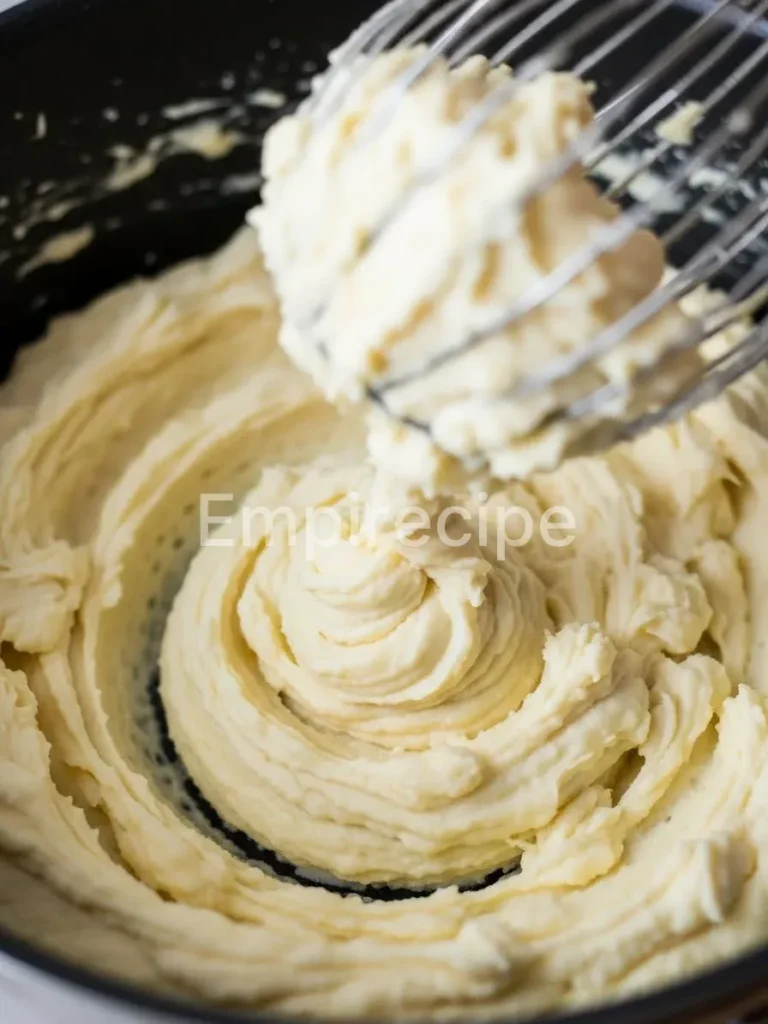
Let’s bring this beautiful Passover Potato Pie to life! Follow these clear steps for a perfectly baked, incredibly flavorful dish that will impress everyone at your table.
- Prepare the Potatoes: Peel the Russet or Yukon Gold potatoes and cut them into 1-inch chunks. Place them in a large pot and cover with cold water. Add a generous pinch of sea salt. Bring to a boil over high heat, then reduce heat to medium-low and simmer until the potatoes are fork-tender, about 15-20 minutes.
- Drain and Mash: Once tender, carefully drain the potatoes thoroughly. Return the hot, drained potatoes to the empty pot or transfer them to a large mixing bowl. Using a potato masher or ricer, mash the potatoes until smooth. Avoid over-mashing, which can make them gummy.
- Sauté Aromatics: While potatoes boil, heat 2 tablespoons of olive oil in a skillet over medium heat. Add the finely diced yellow onion and cook, stirring occasionally, until softened and translucent, about 5-7 minutes. Add the minced garlic and cook for another minute until fragrant. Remove from heat.
- Combine and Season: Add the sautéed onion and garlic mixture to the mashed potatoes. Pour in the plant-based milk and nutritional yeast. Stir in the chopped fresh chives, fresh parsley, smoked paprika, black pepper, and sea salt. Mix everything gently until just combined. Taste and adjust seasoning as needed – this is crucial for a perfectly flavored Passover Potato Pie.
- Prepare for Baking: Preheat your oven to 375°F (190°C). Lightly grease a 9×13 inch baking dish with olive oil.
- Assemble the Pie: Evenly spread the mashed potato mixture into the prepared baking dish. You can smooth the top with a spatula or create gentle peaks with the back of a spoon for a rustic look. For an extra crispy top on your traditional potato pie, drizzle a little extra olive oil over the surface.
- Bake to Golden Perfection: Place the baking dish in the preheated oven. Bake for 30-35 minutes, or until the top is golden brown and crispy, and the edges are bubbling. The aroma of this delicious potato pie will fill your kitchen!
- Rest and Serve: Once baked, remove the Passover Potato Pie from the oven and let it rest for 5-10 minutes before serving. This allows the pie to set, making it easier to serve clean portions. Enjoy this comforting and flavorful dish!
Mastering the preparation of your Passover Potato Pie will ensure it’s a show-stopping dish at your Seder. To add even more heartiness and flavor to your meal, try pairing it with Corned Beef Soup for an unforgettable dining experience.
Pro Tips for Success
Achieving a truly exceptional Passover Potato Pie comes down to a few key techniques. These expert tips will elevate your dish from good to absolutely unforgettable.
- Don’t Over-Mash: Mash the potatoes just enough to remove lumps. Over-mashing can break down the starch too much, leading to a gummy, heavy texture. A potato ricer is excellent for light, fluffy results.
- Season Generously: Potatoes absorb a lot of salt. Be sure to taste the mashed mixture before baking and adjust the salt and pepper. Proper seasoning is paramount for a flavorful Passover Potato Pie.
- Hot Potatoes, Cold Milk: Adding cold plant-based milk to hot mashed potatoes helps prevent the potatoes from turning gluey. The temperature difference ensures a creamier outcome for your traditional potato pie.
- Crispy Top Secret: For an extra-crispy, golden crust, brush the top of the pie with a thin layer of olive oil just before baking. You can also finish under the broiler for a minute or two (watch carefully!) if you desire a deeper golden hue.
- Use Fresh Herbs: While dried herbs can work in a pinch, fresh chives and parsley make a significant difference in the flavor and aroma of this delicious potato pie. Their vibrant notes really shine through.
- Let it Rest: Allowing the potato pie to rest for 5-10 minutes after baking helps it set, making it easier to cut into neat portions. This also prevents it from crumbling when served.
Storage & Reheating Tips
To keep your Passover Potato Pie tasting its best and to minimize waste (a true Hana principle!), proper storage and reheating are essential. You can enjoy this delightful dish for days to come!
- Cool Completely: Before storing, ensure the entire potato pie has cooled to room temperature. This prevents condensation from forming, which can make the pie soggy.
- Airtight Container: Transfer any leftover Passover Potato Pie into an airtight container. This protects it from absorbing odors from other foods in the refrigerator and keeps it fresh.
- Refrigeration: Store the pie in the refrigerator for up to 3-4 days. This makes it a fantastic make-ahead option for meal prep or busy weeknights, offering a delicious potato pie ready to heat.
- Freezing (Optional): If you wish to store it longer, wrap individual slices or the entire cooled pie tightly in plastic wrap, then aluminum foil. Freeze for up to 2-3 months. Thaw overnight in the refrigerator before reheating.
- Oven Reheating (Recommended): For the best texture, reheat individual portions or the entire pie in a preheated oven at 350°F (175°C) until warmed through, about 15-20 minutes for slices, or 25-30 minutes for a whole pie. Covering loosely with foil for the first part of reheating can prevent the top from over-browning, then remove for the last few minutes to crisp it up. This method maintains the crispy top of your traditional potato pie.
- Microwave Reheating (Quick Option): While quicker, microwaving may result in a softer texture. Heat individual slices on a microwave-safe plate in 30-60 second intervals until heated through.
To prolong the enjoyment of your delicious potato pie, proper storage is key. Learn how to keep your leftovers fresh with our tips on making a delightful Cheeseburger Soup that utilizes any remaining ingredients from your cooking.
What to Serve With This Recipe
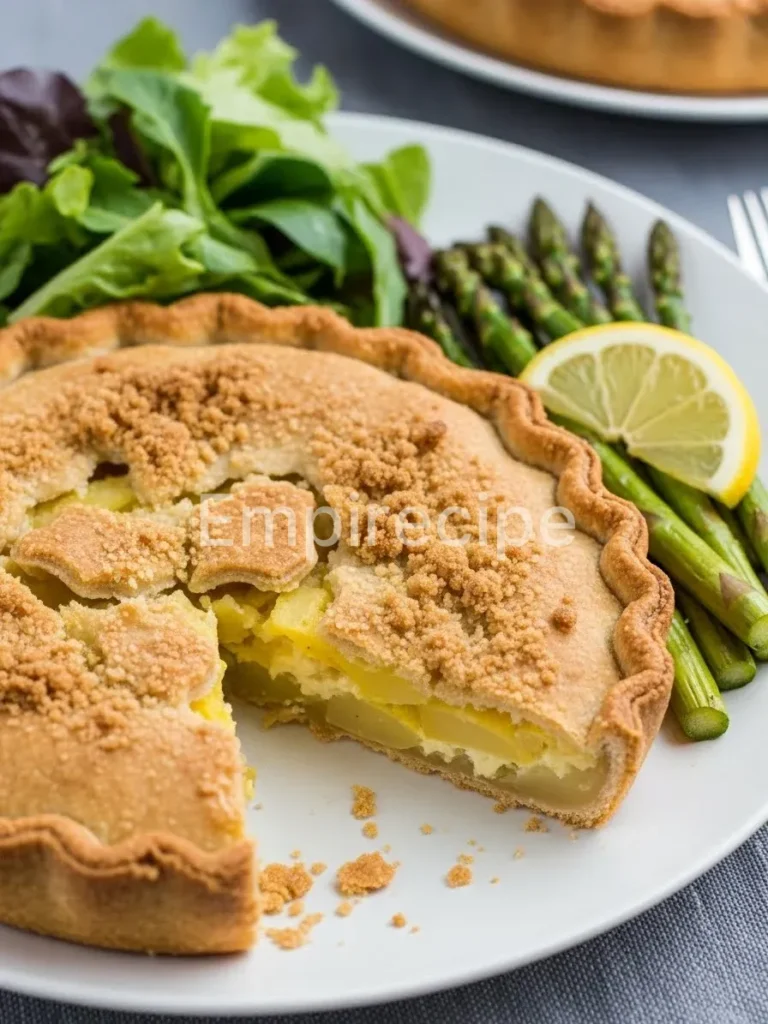
The beauty of this Passover Potato Pie lies in its versatility. As Hana, I love pairing hearty dishes with vibrant, fresh, and often plant-based sides that bring a burst of color and nutrition to the plate. Think about balancing the rich, comforting potato pie with lighter, refreshing elements.
- Crisp Green Salad: A simple mixed green salad with a light lemon vinaigrette is always a winner. It provides a refreshing counterpoint to the richness of the potato pie, adding essential vitamins and crunch.
- Roasted Asparagus with Lemon: Roasting asparagus brings out its natural sweetness and a slight crispness. A squeeze of fresh lemon juice brightens the flavors beautifully alongside this traditional potato pie.
- Steamed Green Beans with Toasted Almonds: Simple, elegant, and nutritious. The crunch of toasted almonds adds a lovely texture, perfectly complementing your delicious potato pie.
- Sautéed Seasonal Greens: Think spinach, kale, or Swiss chard lightly sautéed with garlic. These vibrant greens offer a powerhouse of nutrients and a slightly bitter note that contrasts wonderfully with the savory pie.
- Beet and Orange Salad: For a truly colorful and invigorating side, a salad of roasted beets, fresh orange segments, and a sprinkling of pumpkin seeds provides a sweet, tangy, and earthy balance to the comforting Passover Potato Pie.
- Fresh Fruit Platter: A platter of seasonal fruits like berries, melon, and grapes offers a light, sweet, and refreshing palate cleanser, perfect for a festive meal featuring this incredible Passover Potato Pie.
Frequently Asked Questions (FAQ)
Can I make this Passover Potato Pie ahead of time?
Absolutely! This Passover Potato Pie is an excellent make-ahead dish, which can be a lifesaver for holiday preparations. You can assemble the entire pie, cover it tightly, and refrigerate it for up to 24 hours before baking.
When ready to bake, add an extra 10-15 minutes to the baking time since it will be starting from a cold temperature. This ensures the center is heated through and the crust is perfectly golden. Prepping this traditional potato pie in advance really simplifies entertaining.
What type of potatoes are best for this recipe?
For the creamiest, fluffiest texture in your Passover Potato Pie, Russet or Yukon Gold potatoes are highly recommended. Russets are starchy and break down easily, resulting in a very light and fluffy mash.
Yukon Golds offer a slightly waxier texture but are still wonderfully creamy and have a naturally buttery flavor. Avoid waxy varieties like red or new potatoes, as they tend to become gummy when mashed, which is not ideal for this delicious potato pie.
Is this Passover Potato Pie recipe truly vegan and gluten-free?
Yes, this Passover Potato Pie is crafted to be both vegan and naturally gluten-free! We use plant-based milk and nutritional yeast instead of dairy, and olive oil instead of butter, making it suitable for a vegan diet.
Since potatoes are naturally gluten-free and all other ingredients like herbs, spices, and plant-based milk are also free from gluten, this traditional potato pie is a safe and delicious option for those avoiding gluten. Always double-check labels for any cross-contamination if severe allergies are a concern.
The Passover Potato Pie is a beloved dish that not only highlights the flavors of the season but also serves as a symbol of tradition during the Jewish holiday. This recipe, rooted in cultural significance, provides an excellent way to celebrate the spirit of Passover with loved ones, as described in this comprehensive overview on Passover.
Final Thoughts
This Passover Potato Pie is more than just food; it’s a hug on a plate. It connects us to tradition, nourishes our bodies, and delights our senses. Share this creation with loved ones and make beautiful, delicious memories around the table. It truly is a centerpiece of joy and flavor.
Nutrition Information (per serving)
(Approximate values, based on 8 servings for the Passover Potato Pie)
| Nutrient | Amount |
|---|---|
| Calories | 320 kcal |
| Fat | 10g |
| Saturated Fat | 1.5g |
| Carbohydrates | 50g |
| Fiber | 6g |
| Sugars | 3g |
| Protein | 8g |
| Sodium | 450mg |

Passover Potato Pie: A Delicious and Traditional Recipe
Ingredients
Method
- Prepare the Potatoes: Peel and cut the potatoes into 1-inch chunks, boil until fork-tender.
- Drain and Mash: Drain the potatoes, mash until smooth.
- Sauté Aromatics: Sauté onions and garlic in olive oil until softened.
- Combine and Season: Mix the sautéed mixture with mashed potatoes, add remaining ingredients, and season.
- Prepare for Baking: Preheat the oven to 375°F (190°C) and grease a baking dish.
- Assemble the Pie: Spread the potato mixture in the dish and smooth out the top.
- Bake to Golden Perfection: Bake for 30-35 minutes until golden brown and bubbly.
- Rest and Serve: Let it rest for 5-10 minutes before slicing and serving.


